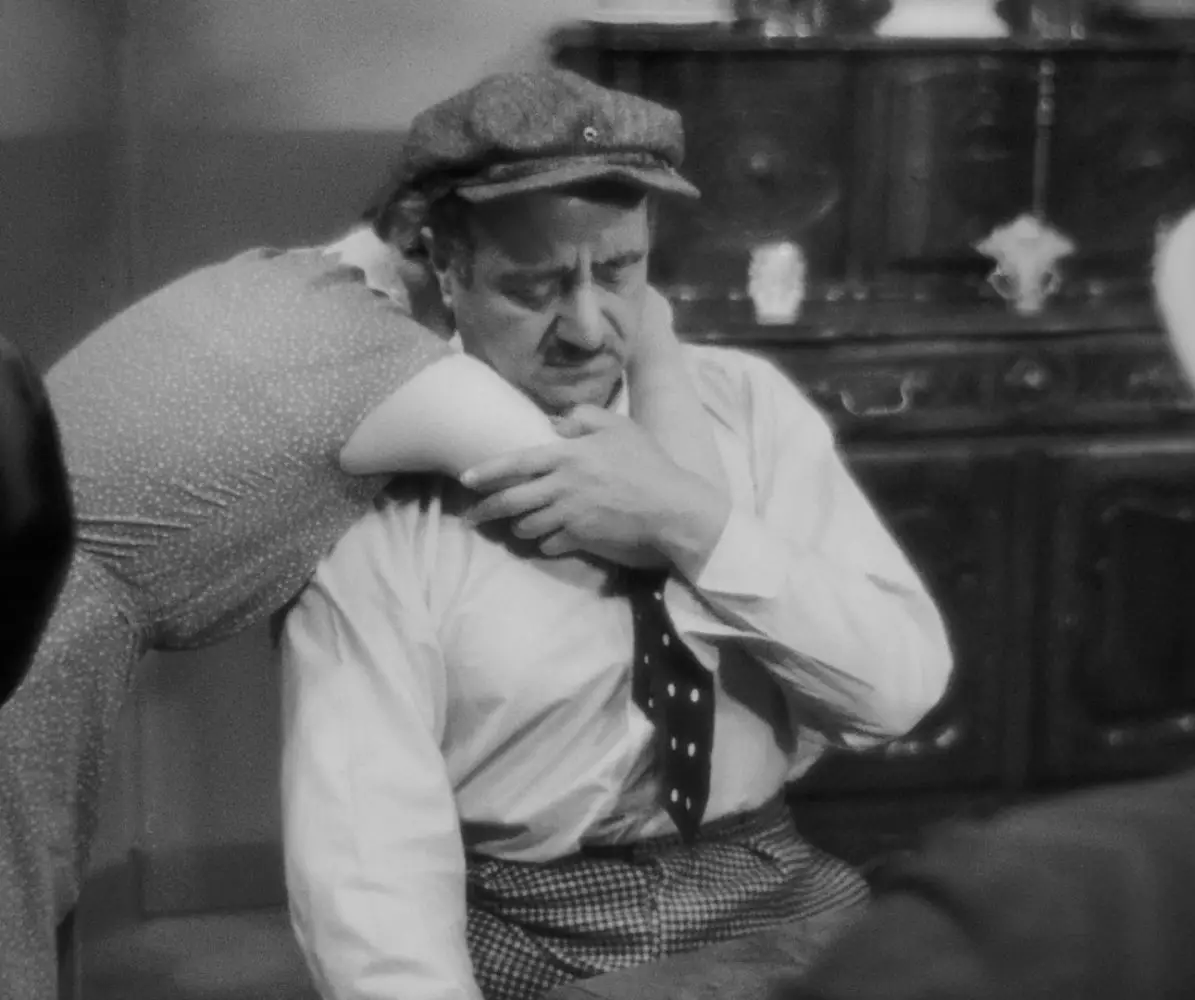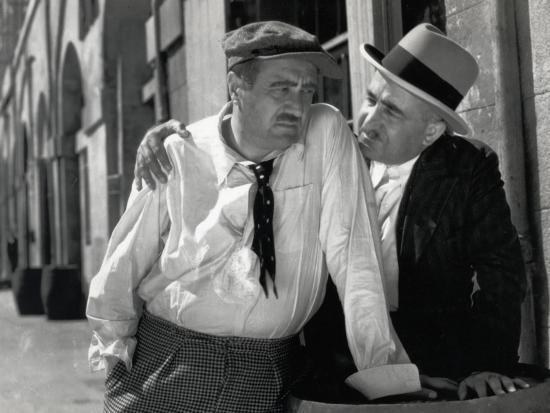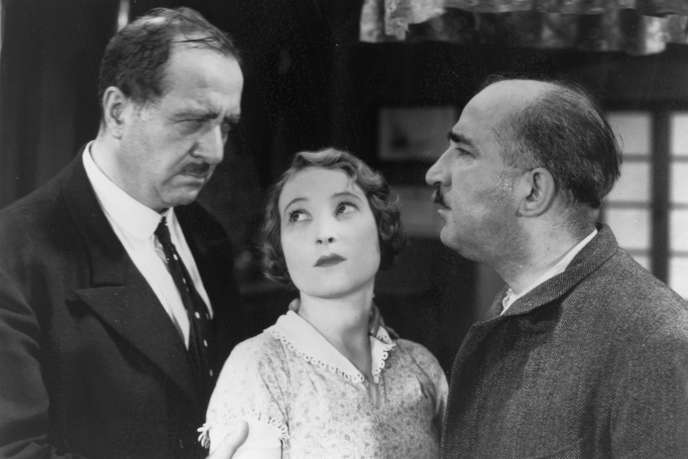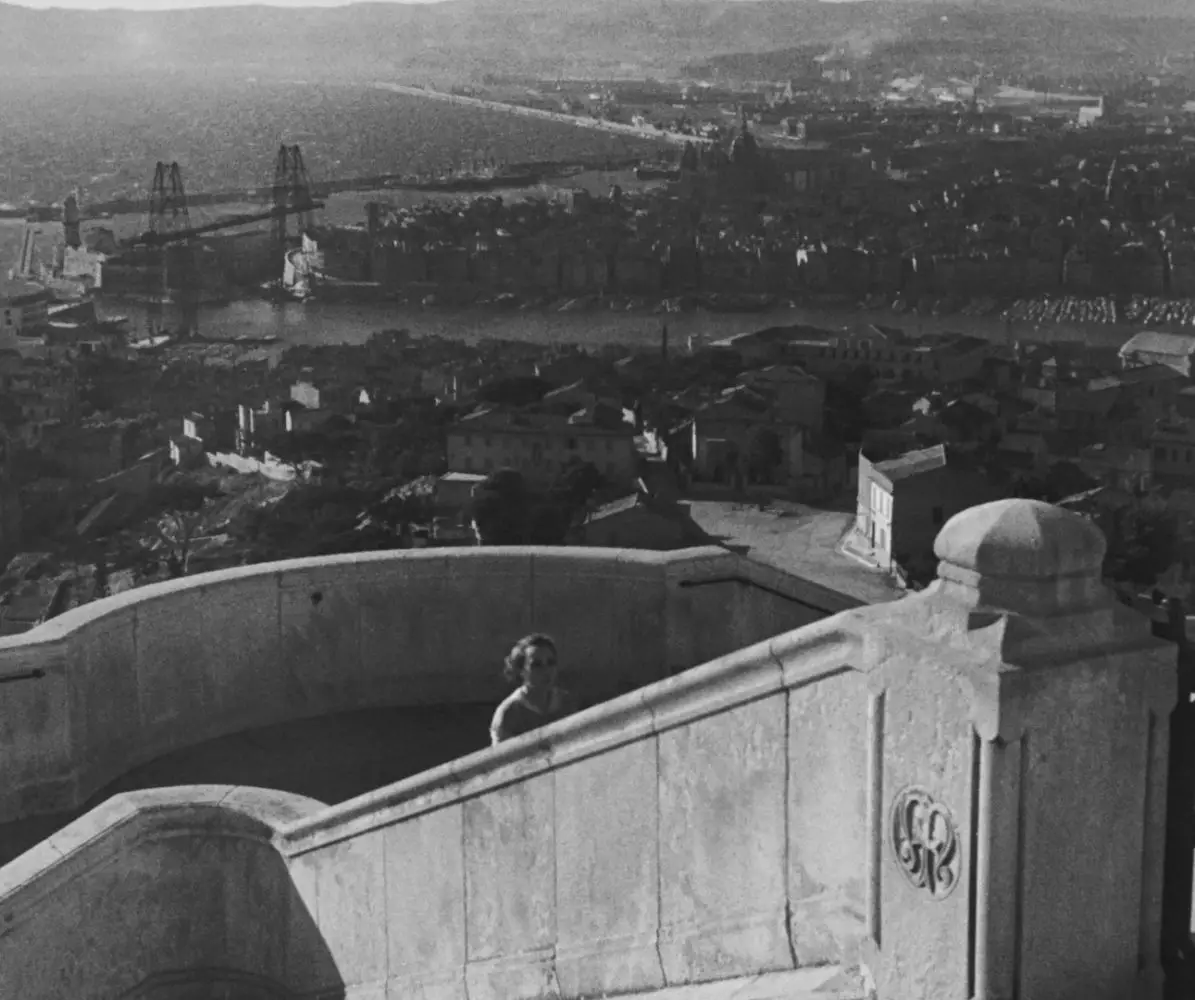In 1932, playwright and screenwriter Marcel Pagnol continued his Marseille Trilogy with the follow-up to his hit 1931 film Marius. Fanny explores the fallout from Marius with touching, beautiful results that surpass the first film in its understanding of people, relationships, humanity, hope and the complicated nature of love.
It’s probably needless to say, but if you haven’t watched Marius, you might not want to read any further; there will be some spoilers to that film here. Fanny is based on a 1931 Pagnol play of the same name, and it picks up right where Marius left off. Marius (played by Pierre Fresnay) has left to pursue his dream: exploring the seven seas on a years-long voyage. In his wake, Marius leaves his tough but loving father César (Raimu) and his distraught almost-wife Fanny (Orane Demazis). César looked forward to Marius marrying Fanny and the two having children. Fanny fantasized about spending the rest of her life with Marius, whom she gave up so he could chase his dream.
Marius’s departure hurts César, who waits anxiously every day for a letter from his son. Meanwhile, Fanny has fallen ill and isn’t eating much. At the behest of César’s friend Honoré Panisse (Charpin), Fanny visits a doctor to confirm her suspicion: She’s pregnant with Marius’s child. Fanny dreads her horrifying future: Family, friends and everyone in the French port of Marseille surely ostracizing her once they find out about her child conceived out of wedlock. The older, wealthy and recently widowed Panisse asks for Fanny’s hand in marriage. For the young woman and her unborn child, it would mean a name, honor and a comfortable life. But Fanny doesn’t know if she can saddle Panisse with another man’s child.

I’ve never seen a sequel that felt this necessary. Marius stands alone—if Pagnol never made a sequel, Marius would’ve been satisfying and complete. But it begs for a sequel. Marius leaves the story open, and you’re invested enough in the characters that you need to find out what happens next.
Fanny takes the hanging threads from Marius, César and our title character, and asks, what’s next? How do people deal with the absence of someone who’s chosen to leave his life? How do they find hope again without someone who gave their life meaning? Pagnol’s answers are wise and genuine: They turn to friends and family, make new connections, create new families and find strength in each other.
Pagnol’s wit is, as ever, on display, as when Fanny’s mother is discussing parenthood:
When you have no children, you’re jealous of those that have. And when you do have some, they drive you crazy! The Holy Virgin only had one child, and look at all the trouble he caused her.
While the playwright can’t resist throwing an appropriate level of humor into the film, his characters never become cold, or distanced from Fanny and César’s emotional woes. On the surface, César’s friends crack jokes at his recent habit of obsessively waiting for the mail every day. Subtextually, they’re showing genuine concern for César and his depression. It’s actually incredibly touching, and the film’s caring nature always succeeds in warming your heart.

While he introduces us to a few new characters, Pagnol mostly sticks to further developing his Marius ensemble, primarily Fanny (duh), César and Panisse. You grow closer to some, more distant to others. My new second-favorite character is Panisse. Pagnol expands Panisse from comic relief and a minor obstacle in Marius to a warm, caring, honorable man of pathos looking for love and someone to pass down the family name. On the other side, Pagnol made me hate another character I took to and understood in Marius (whom I won’t mention by name for spoiler reasons). I like that I hate that character in Fanny. The character was selfish, pretentious and unlikeable in ways I hadn’t realized when watching Marius. And, in life, you sometimes realize that about people. Turning a previously relatable character into a giant jerk was brave of Pagnol, and I admire him for it.
Fanny furthers Marius’s “love is complicated” narrative. Sometimes you have to forgo the person you love for the betterment of everyone. Plus, the choices we make for love aren’t always great, and while we may regret those choices, we have to live with them and their consequences.
But far and away, my favorite aspect of Fanny is its exploration of fatherhood. Pagnol asks the common questions. What does it mean to be a parent? Is the biological parent more important than the person who actually raises the child? Ultimately, it’s love that’s important. Love makes children strong. Pagnol states his heartfelt view so eloquently that you find yourself yelling, “Yes, yes, yes!” at the screen. What I love about it is that Pagnol doesn’t simplify these real human issues. They’re complicated, and that’s how they play out on screen, with points of view clashing and answers sometimes drawn out and painful.

What I love more and more about Pagnol’s writing is his ability to express complexity in the simplest of ways. He uses small acts—writing a letter to a loved one, or a personal, comical story of infertility—to state big ideas and emotions. Pagnol takes moments and conversations you could find in anyone’s life to examine people and what we yearn for in our hearts.
My only problem…well, no, it’s not a problem. It’s really a nitpick. My only nitpick is the directing style and cinematography isn’t quite as good this time out. Marius‘s director Alexander Korda and cinematographer Theodore J. Pahle expertly used light and shadow to stage beautiful compositions. Sadly, each trilogy installment has a different director. Fanny was helmed by director Marc Allégret and a whopping four directors of photography: Nicolas Toporkoff, Roger Hubert, George Benedict and André Dantan (don’t ask me why there are so many DPs, because I have no idea).
Fanny certainly looks fine, but it doesn’t stand out visually like Marius. The greatest compliment I can give Fanny’s cinematography is that Allégret appears to have done more location shooting than Korda. This allows Allégret and his DPs to give us some gorgeous shots of Marseille that I want printed out and hung on my wall.

I worried that Fanny wouldn’t live up to the first film. It did, and then some. I only hope the trilogy’s last entry is up to the monumental task of following such a rich, human experience. I adore all these characters, and I’m sad I’ll have to say goodbye to them soon.
Come back in a few weeks for the conclusion of this intimate trilogy with 1936’s César.
Fanny is available on DVD and Blu-ray and is currently streaming on The Criterion Channel.


